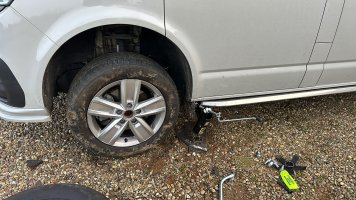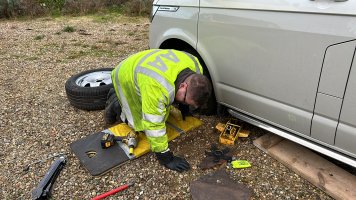Loz
Super Poster
Lifetime VIP Member
There was also a TSB issued over the Touareg to correctly torque to 180NM as there were issues with wheel wobble if only torqued to 150...
Perhaps this will help.
If a fastener or bolt is stated 'dry' torque then that is what it should be done,
When you apply a torque to a fastener. It, in effect puts the bolt under a specific preload/ tension.
The 'nuts and bolts' of it are :- If you apply torque to a bolt / fastener, you are essentially stretching or preloading the bolt. This is done to prevent the fastener from giving / relaxing too much and the nut/bolt from coming loose - or even worse, falling off.
The thing that the manufacturers work out for you is “how much preload do I need?” to stop my bolt releasing itself.
We use a basic rule for our industrial applications, this is usually based on a preload of 68% of the yield strength of the fastener.
This value was chosen because any given bolt/fastener has a 'proof load value' which is related to its material grade and diameter.
Proof load is usually 90 percent of the yield strength of the bolt / fastener.
This in effect guarantees that the bolt / fastener will not permanently yield or stretch.
If it were to do this, you loose your desired preload thus leaving the fastener to eventually fail or fall out.
This next bit is why the 'Dry figure' is important , you could easily assume why isn't the proof load level used for setting the preload of the fastener .
This is not done because of friction !!.
Ie - the coefficient of friction between a bolt threads and nut threads can vary tremendously.
The coefficients of friction can vary as much as +/-20% of the original nominal values.
So if a value close to the proof load (i.e. 80%) is used and the variance was in the suggested range (+/-20%) maybe for arguments sake around 18% , you could end up going close to or beyond the proof load and yielding the fastener, thus applying no preload.
It would still feel tight but would be stretched beyond its real capacity
Sorry for being so long winded , but the above is why you should know what effect the the coefficient of friction has on the nuts and bolts you use.
If the fasteners are dry they can normally vary the coefficient of friction from 0.15 to 0.25.
But if any sort of lubrication is used (ie.thread paste/ dry film lube/ WD-40), etc.), it will change the coefficient of friction quite a bit. 0.20 is used for the unlubed coefficient of friction and 0.09 for the lubed coefficient of friction. So As you can see the use of Lubrication in effect half the expected friction applied to the bolts / threads. ie its easier to tighten up, which unfortunately means you are possibly taking the bolt/ fastener threads past their design limit.
 Another excellent example of automotive style before practicality me thinks.
Another excellent example of automotive style before practicality me thinks.You should definitely NOT grease the bolts or the holes. The torque settings are for dry bolts. By all means clean/wire brush but no grease.
Worked in the motor trade for 50 years and a major utility for 15 of these also the consruction plant industry where grease/oil/lubricants are used on fasteners lots. If used sparingly lubricants make assembly/dissassembly easier. What would you prefer a wheel that will not come off or come off easily. Also remember as with tyres/wheel bolts/nuts should be checked regulary . I am not advocating you do this its your choice but used sparingly it alleviates a lot of problems.Not sure I agree with that, the threaded section can be coated with copper slip but non should be applied to the conical mating surface of the hub/bolt head. If the threaded section is causing friction it could result in not achieving the correct setting.
Have had an interesting conversation with VW customer services; they responded to my comments about the changing of wheel at the roadside, and apparently were pleased to know of a issue!Worked in the motor trade for 50 years and a major utility for 15 of these also the consruction plant industry where grease/oil/lubricants are used on fasteners lots. If used sparingly lubricants make assembly/dissassembly easier. What would you prefer a wheel that will not come off or come off easily. Also remember as with tyres/wheel bolts/nuts should be checked regulary . I am not advocating you do this its your choice but used sparingly it alleviates a lot of problems.
Unfortunately I bet that interest lasted about as long as the phone call.Have had an interesting conversation with VW customer services; they responded to my comments about the changing of wheel at the roadside, and apparently were pleased to know of a issue!
Never on the bolts!Googled it and recommends between wheel and hub and on the bolts.
While I'm at it I will treat all the seals with the stuff I bought and thread lock the camping chairs.
Mike
Never on the bolts!



I can't see how that would be a warranty issue.I’ve had a real problem getting the wheels off an 18 month old coast due to corrosion. I had a puncture in a front n/s tyre so started the process of replacing it with the spare. I’m away from home at the moment with my 87 year old mother. I couldnt get the wheel off the hub and ended up calling VW assist ( AA). The mechanic walloped the wheel off from the inside with a rubber mallet. He used his own jack suggesting the VW supplied Jack couldn’t take that amount of hammering as it make the jacking unstable. The VW /AA response was quick and efficient. I’m now sat in National Tyres in Norwich. The tyre fitter came through to tell me that the other wheel f/o/s was badly corroded and that he’d applied some grease. The wheels are 17” Davenports. Is this a warranty issue ?
View attachment 117636
View attachment 117637
You can, and it's certainly not foolish with some simple measures.Thanks for the advice.
The wheel hubs seem, or the two I’ve seen seem really rusty. I thought the point of the VW Jack and spare wheel ( I deliberately didn’t go for 18” wheels so that I’d have a spare). Was that you could use the jack to change the wheel yourself in the event of a puncture. The AA man said yesterday that the amount of force required to get the wheels off make using the supplied jack dangerous. Echoed by the National tyre fitter today who said he’d used a wire brush to get rust off the contact surfaces. Both suggesting you can’t or would be foolish to change a wheel yourself.
My wife’s Audi is 8-9 years old. The wheels come off when the bolts are undone.
Just going back to the AA fella he said that all VW vans are the same and the metals incompatible/lead to corroding hence me pitching the issue in to the forum members.
Phil
Wheel bolt threads should NOT be greased. The torque setting is for dry threads.You can, and it's certainly not foolish with some simple measures.
What do you think the torque difference would be between nice new clean bolts and fresh tapped holes and 10 year old dry corroded threads and studs?Wheel bolt threads should NOT be greased. The torque setting is for dry threads.
I have no doubt there will a significant difference.I have no idea, why is that relevant?
The thread in the hub will have been cleaned out by removing the stud when taking the wheel off & the thread on the stud at the point where it is tightened up will have spent its life protected from corrosion due to being embedded in the hub so there shouldn’t be much difference at all.I have no doubt there will a significant difference.
 ) answer is that a faintish smear of copper grease never did anyone any harm, AFAIK. It's anti-seize, not a lubricant. I use it on my rally cars and my regular motorsport mechanic advises it, based on his lifetime of real world experience.
) answer is that a faintish smear of copper grease never did anyone any harm, AFAIK. It's anti-seize, not a lubricant. I use it on my rally cars and my regular motorsport mechanic advises it, based on his lifetime of real world experience.
The VW California Club is the worlds largest resource for all owners and enthusiasts of VW California campervans.

